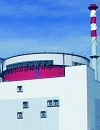 |
||
|
Christophe Behar: ASTRID will be a demonstrator of innovative options AtomInfo.Ru, PUBLISHED May 20, 2010 French nuclear experts are discussing the design options for new fast sodium reactor ASTRID. It should be the Gen IV reactor and the prototype for future commercial fast reactors to be deployed in the most advanced European nuclear country. Today the AtomInfo.Ru online newspapers asks Christophe Behar to elaborate the main features of ASTRID and its role for the French nuclear program. He was appointed Director of CEA's Nuclear Energy Division in April 2009 and now he is in charge of the whole nuclear energy sector of France. "France considers that fast reactors deployment and a close fuel cycle are necessary conditions for a sustainable nuclear energy development both for natural resource saving and for waste management as well", said Mr. Behar in the e-mail interview for AtomInfo.Ru. "The current recycling strategy of MOX fuel in the PWR fleet is an intermediate step in that direction which pave the way for the future and allows significant advantages as such on those two issues but it is not sufficient in the long term. France doesn't intend to recycle MOX spent fuel in LWR but consider MOX spent fuel stockpile as a strategic Pu reserve for the start up of the fast reactor fleet," notes Mr. Behar. There are several known fast reactor concepts but French nuclear scientists pay attention to two of it. "Sodium cooled fast reactor is the mainstream option but we keep a significant effort on gas cooled fast reactor development especially in an European framework," reminds Mr. Behar. "Regarding sodium cooled FRs, deployment of commercial FRs schedule will depend on economic scenarii and is likely to start by 2040. The speed of fast reactor deployment is also a parameter of these scenarii but LWR will be operated along with FR during all the century." ""In order to sustain fast reactor development, the road map is to operate a first of a kind by 2040, and a prototype by 2020. This prototype, call ASTRID (Advanced Sodium Technical Reactor for Industrial Demonstration), will be a demonstrator of innovative options regarding safety and economy," said Director of Nuclear Energy Division. Suffice it to say that the French are not the young Rookies in the field of fast reactors. They have the great experience with Phenix and SuperPhenix sodium reactors. New generation of French scientists does not forget it. ""Phenix and Superphenix experience is a strong backbone on which we back our current studies but ASTRID will be significantly different since the goal is to reach the same performaces than the current EPR especially in terms of safety," confirms Mr. Behar. "We are preparing now a review of these design options and the decision has to be made in 2012, by the public authorities. ASTRID basic and detailed design will be launched afterwards if a green light is given, and we expect this important step to last five years," elaborates Mr. Behar. "FR spent fuel treatment and plutonium recycling will be based on current technologies (hydrometallurgy and melox base process). An evolution R&D is necessary but we already know that these technologies are basically suitable for fast reactor cycle. So the current recycling industrial experience is really a bridge between GII/GIII and GIV systems. This is possible since France consider only MOX fuel, or possibly carbide fuel in the future and both are suitable with Purex/Coex process." "The first and main goal of recycling is the multirecycling of plutonium, which is only possible in fast reactors and the coming R&D is to consolidate this objective." "We do also carry out R&D for minor actinides separation and transmutation in order to develop clean GIV cycle, without minor actinides in the ultimate waste. We are very confident on the feasibilty of such techniques provided that there is some R&D to carry out. We have already accumulated a lot of datas to support this confidence but we need still to continue the R&D especially in the field of transmutation and Astrid will also be an experimental tool for this purpose," said CEA official. Certainly, one shall not hesitate to ask if any future cooperation is possible between two the most prominent countries in the fast reactor development, namely, Russia and France. We do and the answer we received from Mr. Behar is encouraging. "Regarding cooperation with Russia, a new framework agreement between Rosatom and CEA is to be signed very soon and obviously cooperation in the field of fast reactor and close fuel cycle is an important issue to be dealt with in this framework. Our two countries has had a long tradition of cooperation in this field and we are keen to continue", supposes Christophe Behar. Topics: Europe, France, Fast breeders Other news: The Temelin tender promises to be the most fun of all tenders for the construction of nuclear facilities. Iran, IAEA must sign agreement to start nuclear swap - official Uranium from Iran shall be delivered to Turkey within a month. Joint Russian-Turkish NPP construction deal to be sent to parliament in days Over $20 billion will be invested in the construction of Turkey's first NPP. |
Hero of the day 
Obama nuclear summit: A minor success Further proof of this fact was provided by Obama Nuclear Security Summit held in Washington on April 12-13. However, this goal is unlikely to be achieved in four years. INTERVIEW
Steven Kirsch OPINION
AtomInfo.Ru |

